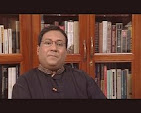
In the second half of the 20th century, the Virginia school of political economy has emerged as an important research program that explores the boundary between law, economics and politics. Although that research program is now carried out by many prominent economists and political scientists around the world, the work and personality of James Buchanan has always played an important role in its development, and in its appeal. http://rdc1.net/forthcoming/jmbvap.pdf
"Buchanan's book, The Calculus of Consent (1962), co-authored with Gordon Tullock, is considered one of the classic works that founded the discipline of public choice, a melding of economics and political science. In particular (1962, p. v), the book is about the political organization of a free society. But its method, conceptual apparatus, and analytics "are derived, essentially, from the discipline that has as its subject the economic organization of such a society."
The Calculus of Consent argues that government decisions are part of the economy, not exogenous factors. Therefore, methods of collective decisions must be studied as part of the study of the public sector. Calculus further describes the constitution as the line that is drawn between private and collective action. Public choice is then divided between pre- and post-constitutional phases.
Buchanan has also written extensively on the theory of the fiscal constitution. His work The Power to Tax: Analytical Foundations of a Fiscal Constitution (with Geoffrey Brennan) was ground breaking on how fiscal decisions are made. Buchanan's writings have also challenged traditional assumptions about the role of self interest in political decision making.
Public Choice theory has evolved into two branches — a normative branch which attempts to derive principles of an appropriately organized set of public decisions, and a positivist branch which attempts to develop predictive theories of behavior.
Major Works of James M. Buchanan
The Pure Theory of Public Finance: A suggested approach", 1949, JPE
"Individual Choice in Voting and the Market", 1954, JPE
"Social Choice in Voting and Free Markets", 1954, JPE
Public Principles of Public Debt, 1958.
"Positive Economics, Welfare Economics and Political Economy", 1959, J Law Econ
Fiscal Theory and Political Economy, 1960.
"Externality", with W.C. Stubblebine, 1962, Economica
The Calculus of Consent: Logical foundations for constitutional democracy, with G. Tullock, 1962.
"What Should Economists Do?", 1964, Southern EJ
"Ethical Rules, Expected Values and Large Numbers", 1965, Ethics
"Economics and Its Scientific Neighbors", 1966, in Krupp, editor, Structure of Economic Science
Public Finance in Democratic Process: Fiscal institutions and democratic choice, 1967.
Demand and Supply of Public Goods, 1968.
"An Economist's Approach to Scientific Politics", 1968, in Parsons, editor, Perspectives in the Study of Politics.
Cost and Choice: An inquiry into economic theory, 1969.
"Is Economics the Science of Choice?", 1969, in Streissler, editor, Roads to Freedom
"Notes for an Economic Theory of Socialism", 1970, Public Choice
Academia in Anarchy, with N.Devletoglou, 1971.
"Equality as Fact and Norm", 1971, Ethics
"Before Public Choice", 1973, in Tullock, editor, Explorations in the Theory of Anarchy
The Limits of Liberty: Between Anarchy and Leviathan, 1975.
"Public Finance and Public Choice", 1975, National Tax Journal
"A Contractarian Paradigm for Applying Economic Theory", 1975, AER
"Barro on the Ricardian Equivalence Theorem", 1976, JPE
"Methods and Morals in Economics", 1976, in Breit and Culbertson, editors, Science and Ceremony
Democracy in Deficit: the political legacy of Lord Keynes, with R.E. Wagner, 1977.
"Markets, States and the Extent of Morals", 1978, AER
Freedom in Constitutional Contract, 1978.
What Should Economists Do?, 1979.
The Power to Tax: the analytical foundations of a fiscal constitution, with G. Brennan, 1980.
"The Homogenization of Heterogeneous Inputs", with R.D. Tollison, 1981, AER
"The Domain of Subjective Economics: Between predictive science and moral philosophy", 1982, in Kirzner, editor, Method, Process and Austrian Economics
"Order Defined in the Process of Emergence", 1982, Literature of Liberty
The Reason of Rules: constitutional political economy with G. Brennan, 1985.
Liberty, Market and the State, 1986.
"The Constitution of Economic Policy", 1987, AER
Economics: between predictive science and moral philosophy, with G. Brennan, 1988.
Explorations in Constitutional Economics, 1989.
The Economics and Ethics of Constitutional Order, 1991.
"From the Inside Looking Out", 1991, in Szenberg, editor, Eminent Economists
Constitutional Economics.
Better than Ploughing and other personal essays. 1992
"Economic freedom and competitive federalism: prospects for the new century", 1996, Nobelists for the Future
"Generalized Increasing Returns, Euler's Theorem, and Competitive Equilibrium" with Yong J. Yoon, 1999, HOPE
Collected Works of James M. Buchanan, 1999




No comments:
Post a Comment